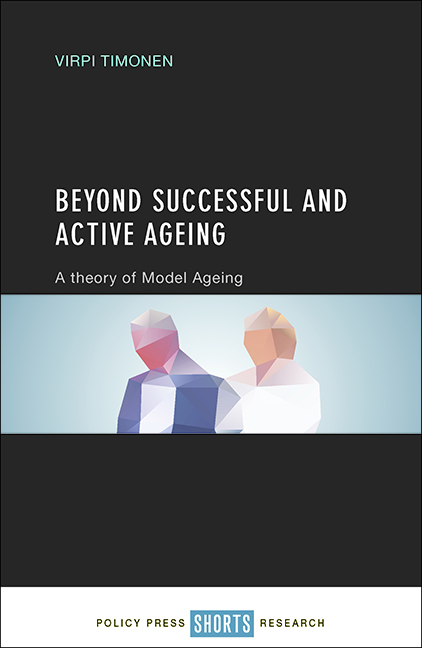Five - Towards a theory of model ageing
Published online by Cambridge University Press: 01 September 2022
Summary
In this chapter, I take the first steps towards the model ageing theory. I employ the term ‘model’ in two different but closely related ways.
First, I use it to describe what various actors do with and to ageing, and what then ensues: they model (verb) old age and the people who are defined as old. As a result of this modelling, different models (noun) of what are good, appropriate, proper ways to age have come into existence. Use of the terms successful ageing, active ageing, positive, healthy, productive ageing and so on is ubiquitous and variable. However, all these concepts attempt to model ageing as a phenomenon and stage of life that is perceived to be in need of direction, reshaping and control.
For instance, gerontologists model (verb) successful ageing by generating data on how people within the older population fare (how long they live, how healthy they are, to what extent they take part in paid and unpaid work) and then assigning labels that signal how different categories of old people are performing (‘normal ageing’, ‘pathological ageing’, ‘successful ageing’ and so on). In addition to gerontologists, policy makers are very interested in older adults, and so they have also sought to model (verb) old age policy and older adults’ incentive structures in a particular way, for instance in a direction that would be encouraging of longer working lives. Businesses and entrepreneurs are another group interested in old people, in their case as consumers of goods and services, and so they also model (verb) their target group in a particular way: typically as dynamic and attractive, provided they become consumers of various goods and services.
As a result of the efforts of these actors who model ageing, models (noun) of ageing have come into existence. For instance, the model (noun) of old age that suggests that older adults should continue working until retirement – and preferably longer – is now firmly a part of the definition of how to age appropriately in most developed welfare states. Another widespread model (noun) of ageing pertains to the idea that older adults should consume goods and services, that is, that they should promote both their own well-being and the good of the economy as a whole through their consumer power and choices.
- Type
- Chapter
- Information
- Beyond Successful and Active AgeingA Theory of Model Ageing, pp. 87 - 102Publisher: Bristol University PressPrint publication year: 2016

